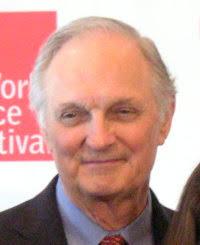Alan Alda has Parkinson's disease. Just like that, the well-known actor disclosed his condition for the first time Tuesday on national TV. He did not appear defeated, depressed or morose. In fact, just the opposite.
Alda said he's remained active since receiving his diagnosis three-and-a-half years ago, and it really hasn't slowed him down – yet.
"It hasn't stopped my life at all," said the 82-year-old, speaking on CBS This Morning, adding that among his physical activities he participates in boxing three times a week.
Yet the primary reason he decided to publicly announce his condition is that Alda is a self-proclaimed science communicator. Since being a young boy, he's reveled in the joys of science and the curiosity that it inspires. And now he's sharing what he's learning about dealing with this disease so others can learn how to proactively live with it more effectively. And the first step is, if at all possible, not to fall apart or descend into self-pity.
"Don't be immobilized by fear," said Alda, who hosted Scientific American Frontiers on television for 13 years and conducted more than 700 interviews with scientists over that time. "I'm not angry ... because it's a challenge," referring to the need to adapt to unexpected body changes that emerge over time. "It's like a puzzle to be solved. ... And I enjoy solving puzzles."
Equally important, Alda says, is taking action immediately if you begin to sense there's something wrong with your nervous system. That's because early diagnosis provides the best chance to effectively manage Parkinson's, which is characterized by muscle tremors, coordination difficulties, poor balance and stiffness.
What made Alda seek out medical advice so early? He recalled an article he read in 2015 about Parkinson's research involving REM sleep behavior disorders, having done so after an episode where he "was having a dream that somebody was attacking me and I threw a sack of potatoes at them,” Alda said during Tuesday's interview. "What I was really doing is throwing a pillow at my wife” (whom he's now married to for 61 years).
The article Alda read, which appeared in the New York Times, stated that Parkinson's researchers had learned that the sleep disorder can be "characterized by a tendency to act out one’s dreams while asleep," which "is one of the strongest prediagnostic symptoms" for the disease.
 Having read that, Alda, whose best-known role was playing a doctor, Hawkeye Pierce, in the hit TV series M*A*S*H, wanted to have a neurological exam for the disease.
Having read that, Alda, whose best-known role was playing a doctor, Hawkeye Pierce, in the hit TV series M*A*S*H, wanted to have a neurological exam for the disease.
"I asked for a scan," he said, adding that at the time "I didn't have any symptoms."
His attempt to get ahead of the curve corresponds to what neurologists believe about Parkinson's, that damage in the brain to neurons that produce dopamine can occur well before physical symptoms are readily apparent.
"By the time patients develop characteristic Parkinson’s symptoms," noted the Times article, "the brain has already lost more than half of its dopamine-producing cells."
Therefore, slowing the inevitable "dopamine deficit" during this "preclinical" Parkinson’s phase is key. And researchers have pointed out for some time that while there's no specific treatment for the disease, exercise and movement of almost any kind has been seen as a means of keeping Parkinson's somewhat at bay and slowing down its impact.
"I don't have many symptoms," one of which is a twitching thumb, which he mentioned to John Dickerson of CBS News during a later interview, "but it is a progressive disease," yet "exercise of any form can hold off many of the symptoms.
"Part of my message is that there's a stigma attached to Parkinson's," Alda said. "It starts with something that's almost imperceptible," ... but "if you undergo the right kind of exercise and other kinds of treatment you can hold off severe symptoms for a long time."
While Alda said discussing ways to battle Parkinson's disease is "not going to become my cause," he did say Tuesday that he's "committed to communicating science." He's doing so by continuing his work at the Alan Alda Center for Communicating Science at Stony Brook University on Long Island, NY, and through a newly-launched podcast titled " Clear+Vivid." Yet Alda simply loves science and is fascinated by what wonders can come from it.
When I had the opportunity to interview him a decade ago about his involvement in the World Science Festival, which has been held annually in New York, Alda's enthusiasm was palpable even though the phone line.
"It's not, 'There is us and then there are these brainy people doing things that have nothing to do with us,' Alda told me in May 2008. "Our entire world runs on science. Everything. What you and I are doing on the telephone wouldn't have been possible without Einstein."
And ever the science purist who values the benefits of empirical knowledge, Alda's overall takeaway message is to "not follow quackery, and find out what real science is coming up with that helps."




